Genre: Platformer Developer: Funcom Publisher: Disney Interactive Players: 1 Released: 1996
Disney’s films don’t mess with the formula much. There is always a heroically somber storyline, plenty of idle merriment, songs, foreign-voiced villains, virginal heroines, sly censor-bait, a heterosexual love story, and benevolent triumph. It’s hard to argue with that, and I’m sure I’ve missed the rare exceptions, but as a gamer who doesn’t give a damn about full-length cartoons it’s often nettled me that Disney never felt the need to stretch its video game wings and give us something really different. Pocahontas, with its unpopular subject and female protagonist, might just have been the ideal chance to change things up. An action RPG. A Metal Gear-style stealth game. Something halfway like Uncharted. So what did Disney give us?
We got a side-scrolling platformer. Huzzah!…? Disney games are almost always good or better, right? Right, and this is no exception, it’s just not novel – nor is it up to David Perry or PlayStation Disney snuff. Still there are a few variations on the formula, but nothing very large. Contrary to the establishment we have a Prince of Persia-like control scheme. What else? It was the year of Tomb Raider after all. Also, a process of adding new abilities, bestowed by beasts, as Pocahontas advances through the game, nothing deep but new to Disney fare. Running is the first gained and brings with it the useful feature of jogging at single button press, with full speed achieved by two presses. Last, and by far the most awesome aspect to the game – she has an animal companion, Meeko the raccoon. (Note: if you don’t like raccoons this is the point where you should stop reading this review, because you suck). The player is free to switch betwixt her and Meeko at any time during gameplay, and in most stages, it’s required to some degree. Unfortunately, Meeko isn’t the show’s star, nor is there even one level that’s predominantly his. Pocahontas also lacks Disney games’ usual diversionary levels such as Aladdin has with Abu, The Lion King with Timon and Pumba, etc.
Play consists of navigating Pocahontas and Meeko to the stage end some distance right of where they begin. She stiffly jogs, grabs and pulls up onto ledges and branches, or swims along till some point a ledge is too high, a gulf too wide, a guard posted, then Meeko, blazing with raccoon awesomeness, scampers up a tree or through a crevice to trundle a stone into position for her to stand on, push a log for her to cross the gulf, or knock something about to distract the humans. This design admits a couple of exceptions, but there are no profound deviations; there’s a decent amount of ascent but nothing that could be called branching. Don’t expect to cover screen the way you would in The Lion King or The Jungle Book. Now, I know the question that’s on your mind: “How does Pocahontas kill things?” I’ve already mentioned Tomb Raider. So, yeah, just like Lara Croft, only minus the guns (i.e. she doesn’t). Foes are sparse and when encountered, eluded or distracted. The powers Pocahontas gains enable her to sneak, swim, fall from heights, and do more adventure platformer acts; their usage is defined in text when acquired but there are a couple places in the game where mildly creative use of an ability is called for.
Whatever challenge there is can be dispatched quickly, as the game’s easy and short. Neither terribly so, but if you’re purchasing on an absolute bang for the buck scale leave this fairly uncommon game alone. That’s a silly scale to use for Disney games, though. Its low action demands might make it a good choice for a very young child. Plus, only Pocahontas loses tries, Meeko can liberally ramble about unharmed, and his missed jumps result in nothing graver than being plucked up by a kingfisher to safety. Passwords are awarded every so often, but it’s too bad that there isn’t another after finishing the game for an enhanced second play. When recording them, be aware that the animal image preceding the numbers and letters must be entered as well. The game’s lone difficulty option is to play with hints on or off. These are prompts that appear too frequently and tell one exactly what to do. They’re on by default so hit up the options menu before starting out. Pursuing that caution further, I wouldn’t read the manual if you have it.
Franchise fidelity’s a tossup. No frills such as cut scenes or even text interlude anywhere, save the most expected places, but then a whole second character from the film is available for play. Overall, I feel it takes a knock due to sub-par graphics, neither the necessary nor the accustomed Disney polish are evident. Then again, it’s clearly not a license poured into some generic mold, much less the crude shoehorning of cinema material into garbage gameplay that the Beauty and the Beast titles were.
Graphically the game falls short of Disney standards, even short of The Jungle Book, with a low amount of detail and a high amount of recycling. By no stretch is the wilderness the varied landscape it should be. Worse, on a present day tv screen everything’s pixilated to a degree more often seen on Amiga games, although the screenshots provided exaggerate the pixel trauma; I’d recommend viewing it over RF. However, it still looks pleasant, and Meeko animates well. Pocahontas is a bit stiff, yet I’m not sure this isn’t a trait begotten by the film, as Disney’s attempts at giving her a heroic demeanor came off rather Egyptian. What should be adduced in its favour is the forest setting. Its dearth of variance is made up for by the general rarity of leafage in side-scrollers. Whereas we usually get lianas and palms, Pocahontas offers a set of cool, autumnal environs.
Aurally, it’s in the same boat: not top notch technically, with compositions that sound less distinct than what one hears in Aladdin, The Lion King, and the rest of the upper tier but still pleasant stuff. There’s a slight shortness of speech samples for a film-based game. Meeko does grumble when wet and, I think, emits occasional idle murmurs (unless they come from Pocahontas. They sound too girlish for either character), but Pocahontas doesn’t definitely voice much other than a Lara-like whuff on running into a rock. Sound effects are few as well and mixed too low against the score.
We’re down to our final review category, the “It factor.” Namely, Meeko. I’m pretty sure raccoons are what Elinor Glyn had in mind when she coined the term. Meeko’s what’s going to make the game for you. If you don’t enjoy scampering about with him, his animations hopping, climbing, falling from trees or being launched from seesaws, you probably won’t enjoy the total experience; it’s simply not full bodied. Apart from Meeko, Pocahontas is just a bony little sister Disney game wearing off-the-rack. Me, I adore Meeko. Hell, I even like Roadkill in Comix Zone. More game protagonists need animal sidekicks, especially those that gambol about with podgy grace. Even Lara Croft could’ve used a flying squirrel, and it has to be an animal that can fly so it doesn’t fall to death along with her every time one’s finger slips off the walk button. Meeko adds charm and fluidity to an otherwise by the numbers and stiff box-office tie-in product. That’s the It factor. And if you don’t get it, I suggest you look for something else to play because for all her animal powers, Pocahontas herself isn’t a whole lot of fun. Luckily the game can’t be played without Meeko.
SCORE: 7 out of 10

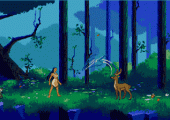
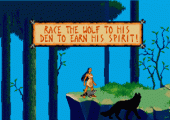
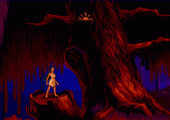
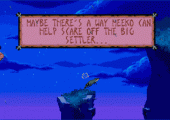
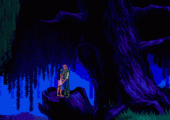
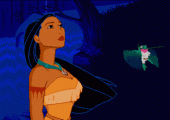
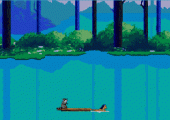
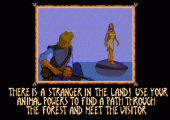

Not original? How so? It’s a Prince of Persia themed semi-Metroidvania with no combat. It’s pure exploration, all the way. Your options for playing a game like this on the consoles is…just this.
It’s never been done again.
Also, about those graphics – it’s from a time when nearly everything else was tile based. The fact that they fit an organic looking forest in a stock cartridge, with anything close to Disney quality animation is a miracle. Visually, it’s as close as the Genesis came to Symphony of the Night,
It seems like the only reason it lacks any kind of respect is because it’s seen as a girl’s game. But those who can keep an open mind are invited to take a break from kill or be killed adventures (they’ll still be there when you’re done), and just once, run free as the wind in a videogame world that welcomes you…